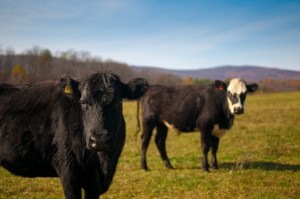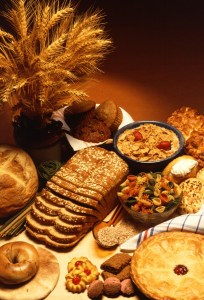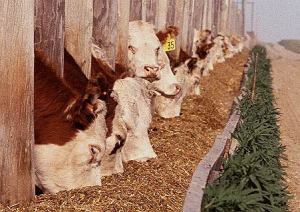3 Food Myths and the Paleo Diet
In my trolling about the web I came across an article that purported to clear up some myths about healthy foods. The article “5 Myths Haunting Your Healthy Foods” on the Business Insider website, listed what they called 5 deceptions, which cheat us out of our food dollars. As a Paleo diet follower and as a person intensely interested in the quality of the food I buy, I thought a rebuttal of sorts was due. In all honesty, I can only dispute 3 of the items. Fair trade foods and products with an excessive number of “nos’ on the package are not an area I am familiar with. In fact, it is entirely possible that the author is correct in these areas. But the other 3 food myths and are connected to the Paleo diet. Let me start clearing the air.
Deception #1 deals with the excessive use of the word “No” on labels. Skipping that one.
Deception #2: Organic Food is Always Better
Despite common perceptions, there’s not a whole lot of evidence that the nutritional quality of organic food is much higher than non-organic food. This is because the term organic itself refers to particular manufacturing protocols used to make the food, and
not necessarily the end product itself.
However, people frequently commit attribution errors when making judgments about organic food. A study conducted at the University of Michigan found that people assume an organic product has less-calories than a similar non-organic product, which causes people eating processed organic food to consume more calories than they would have otherwise. In some cases the inferred benefits of eating organic extend beyond nutrition, and gives people a belief that they need to exercise less because they eat organic.

National Organic Food Program label
The reasoning here seems faulty as to why people eat organic food at all. Yes, it is possible that organic foods are not more nutritious than conventional foods, if both are processed foods. The processing of food removes nutrients. The more processed, the more nutrients that are lost. If you are talking about fresh produce, then there are other reasons to buy organic, even if the nutritional value is not better.
- Synthetic pesticides, herbicides and fungicides - these can remain on the plant and contaminate the end product. We don’t need more toxins in our bodies. The Environmental Working Group has a list of the “Clean 15″ and “Dirty Dozen” fruits and vegetables to buy organically and which are okay to buy conventionally grown.
- Inorganic fertilizers are a petroleum product and are overused. They can disrupt the composition of the soil and can sometimes lead to cadmium poisoning. The main ingredients present in these fertilizers are potassium and phosphorus; due to over usage of these fertilizers, natural fertility becomes scarce. The use of organic fertilizers are better for the environment. They keep the soil balanced and do not burn plants like inorganic fertilizers. (see the Advantages and disadvantages of organic farming)
- Genetically Modified Organisms - by law there cannot be any GMOs in organic food. But it is estimated that 80% of conventionally raised processed foods and produce are GMO. If you want to avoid GMOs, eat organic.
The idea that people assumed that organic food was lower in calories is just silly. Food processed with organic raw sugar or refined sugar has the same amount of calories, It’s just slightly less processed. But I cannot fault the author for that finding. Whatever your reasons, you are still better off eating organic foods than convention foods when possible.
Deception #3 - Fair trade = healthy. I don’t know anything about this one, so I’m not going there….
Deception #4: Grass-Fed Beef
Grass-fed beef has become popular in America, and it’s purported benefits are that it has a more beneficial ratio of Omega-3/Omega-6 fatty acids, a higher concentration of anti-oxidants like superoxide dismutase, and lower levels of nitrates, which creates healthier beef.
These health benefits are either non-existent or exaggerated.
It’s true that grass-fed beef has a higher concentration of omega-3 fatty acids and anti-oxidants than grain-fed beef, but the total amount of these and other nutrients in any kind of beef is very small compared to plant sources. To get the recommended 1.6 grams of omega-3 fatty acid a day from grass-fed beef alone, you’d have to eat 4.6 pounds of beef a day. The biggest health benefits of beef is its high protein content, and the minerals iron and zinc, which have a very high bio-availibility when consumed from meat. The differences between grass and grain-fed beef for these nutrients are not different from one another.
And while it’s true that grass-fed beef has a higher concentration of “good” fat like conjugated linoleic acid (CLA), these observations are typically made with raw meat, and it’s usually lost after cooking. Similarly, the nitrate content in beef is influenced by many variables in the production process, such as the fertilizer used in the soil, run off from nearby water sources, and the moisture level the grass when it’s eaten.
This deception or myth is closely tied to the Paleo diet since one of the basic tenets of Paleo is to eat food that is as close to what our ancestors ate as possible. Grass-fed beef fits the bill very nicely. As with organic foods, there are other reasons to eat grass-fed beef besides the omega 3/omega 6 profile. But first let’s look at the omega 3 issue. Because of what CAFO (Confined Animal Feeding Operations) cattle are fed, their fat is much higher in omega 6 fatty acids, the very acids that raise the risk of disease. Given that people also consume vegetable oils which are also high in omega 6s, I would think that eating grass-fed beef would be of some benefit. From Mercola.com:
The Story on the the Good Fats and Bad Fats
Whereas cellular proteins are genetically determined, the polyunsaturated fatty acids composition of all cell membranes is to a great extent dependent on the dietary intake. There are many kinds of fats in the body. Some of the most crucial fats are in the list of compounds that make up the cell walls for all of the body’s cells.
After isolating these fats scientific experiments determined that if the ratio of omega 6 fats to omega 3 fats exceeds 4:1, people have more health problems. This is especially meaningful since grain-fed beef can have ratios that exceed 20:1 whereby grass-fed beef is down around 3:1.
Similar ratios are also found in all grain-fed versus grass-fed livestock products.
Grassfed products are rich in all the fats now proven to be health-enhancing, but low in the fats that have been linked with disease.
What other reasons would there be for preferring grass-fed to grain-fed beef? From the Health Theory site:

"Salad Bar Beef" at Polyface Farm. Photo by Brian Johnson and Dane Kanter. Image courtesy of Wikipedia.org
… Though cows are ruminants by nature, designed to digest grass, the cattle industry has been using corn for decades to fatten up cattle. A grain-based diet, however, causes many health problems for cattle — and unhealthy cows mean unhealthy meat. Not only does meat from corn-fed cows carry the risk of pathogens such as E. coli, it is nutritionally inferior to meat from grass-fed cows….
Switching cows from grass to grain puts more money in the beef industry’s pockets and cheaper meat on the supermarket shelves. But at what price? The stomachs of cows are naturally pH neutral. A corn-based diet, however, creates an acidic environment that contributes to a host of health problems. Corn-fed cattle are prone to serious health conditions such as bloat, diarrhea, ulcers, liver disease, and a weakened immune system. To combat these health problems, cattle are continually fed antibiotics, which leads to the development of antibiotic-resistant bacteria that increasingly render modern medicine ineffective.
The threat of E. coli
An acidic intestinal tract also favors the growth of E. coli. Michael Pollan, author of The Omnivore’s Dilemma, states that the lethal strain of E. coli known as 0157:H7 is believed to have evolved in the gut of feedlot cattle. The development of a more acidic environment in cows’ intestinal tracts created an acid-resistant strain of the pathogen, which is able to survive the acidic conditions of the human stomach and prove fatal. In the documentary Food, Inc., Pollan states that switching feedlot cattle to a grass diet would eliminate 80 percent of the E. coli in the cows’ digestive tracts.
Still think it’s a good idea to eat CAFO cattle? Just from the perspective of animal health I’d rather eat (and do!) grass-fed beef. From the Paleo diet perspective, while not perfect, grass-fed beef is a very good second choice after wild game.
Deception #5: Going gluten-free is good for everyone

Foods made from what. All contain gluten. Are you gluten intolerant? USDSA photo. Image courtesy of Wikipedia.org
About 1% of the western population has Coeliac’s disease, which is an autoimmune disorder caused by a genetic modification to a peptide in the intestine which breaks down when it comes in contact with gluten based molecules. The consumption of gluten causes an inflammatory response within the intestine when it’s ingested. If you are one of these people, by all means, avoid gluten. You’re allergic to it.If you’re not one of these people, relax a little bit, and do yourself a favor by being more discerning about food labels. It’s true that gluten-intolerance is showing up with an increasing regularity, but it’s still a small percentage of the population and partly caused by people’s increased awareness of it.
For the majority of the population, the presence or absence of gluten has little bearing on the quality of food being eaten. It’s the diet fad du jour, but any diet approach that exclusively emphasizes a single variable is too simplistic.
If you doubt this is the case for gluten, then consider the previous “single variable” diet fads popularized in the past: lactose, fat, sugar, etc. They’ve all been proven wrong.
There should be a consideration here, that while a small portion of the population is diagnosed with celiac’s disease, many people may not tolerate gluten or the other toxins in wheat for other reasons. Grains like wheat cannot run away, so they have developed several toxins like gluten, phytates and saponin which make grains extremely difficult to digest. In an article on this site last year we went this issue and the FODMAP diet which can help correct the problems associated with the consumption of grains. Is EVERYONE gluten intolerant? No, but many more people are grain intolerant than the 1% and they don’t realize it.
These 3 food myths all have a connection to the Paleo Diet. Optimally, Paleo diet adherents should be eating organic plant food since that would be as close to what nature had provided for us prior to the advent of agriculture. We should be eating grass-fed beef or other pastured animals for the same reasons. And most people may have an intolerance to gluten and not know it. We did not evolve eating the large amount of grain we now consume on a regular basis. There is great benefit to be derived from eating cleaner, less toxic food.
Did you find this article interesting and informative? If so, please share on Facebook and Twitter. Any questions, comments or observations? Please leave them in the comments section. Thanks for reading!







Great read. Very well broken down information. I’ll pass this on
I am genuinely grateful to the owner of this web page who has shared this great piece of writing at at this place.